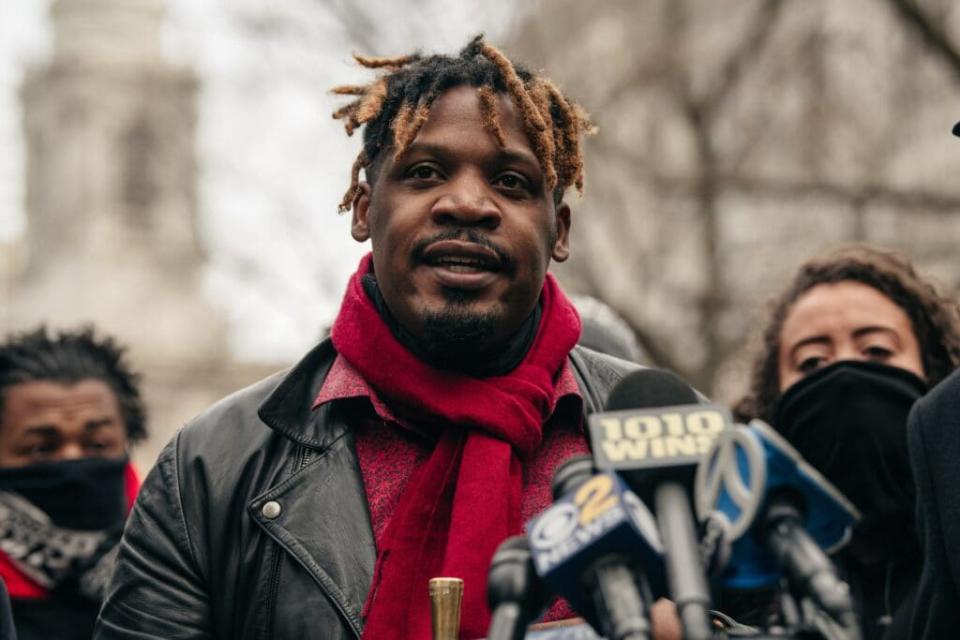Keyon Harrold talks Black History Month playlist, new music, and activism
- Oops!Something went wrong.Please try again later.
TheGrio spoke with the Grammy Award-winning trumpeter about curating a Black History Month playlist for Tidal.
When you think of Black music that addresses social issues, you will find no shortage of classics from James Brown’s “Say it Loud (I’m Black and I’m Proud),” and Curtis Mayfield’s “We People Who Are Darker Than Blue” all the way to De La Soul’s “Stakes is High” and Kendrick Lamar’s “The Blacker the Berry.” You might look around today, however, and find it difficult to hear such songs among contemporary artists.
Not to worry; Keyon Harrold is on the case. The Grammy-winning trumpeter and composer is bringing new anthems of social justice and enlightenment to the forefront, thanks to his collaboration with Tidal. Harrold has compiled a playlist for the streaming service for Black History Month: Keyon’s Elevation Edification Playlist.

Harrold has made quite the name for himself as a sideman for Jay-Z, Common, D’Angelo, and Maxwell, as well as a solo artist. While he’s never been shy about expressing social issues with his music in the past, a 2020 incident in which he and his teenage son were physically accosted while being racially profiled has led him to become more publicly vocal against racial injustice.
The trumpeter spoke with theGrio about making the playlist, expressing socially conscious emotions instrumentally, and when fans can expect new music from him.
Keyon’s Elevation Edification Playlist is an eclectic list of several styles and genres. It mixes well known classics like Sam Cooke’s “A Change is Gonna Come,” and Donny Hathaway’s “Someday We’ll All Be Free” with more current anthems, including Common, Black Thought and Seun Kuti’s “When We Move,” Jon Batiste’s “Freedom,” and rap legends Public Enemy doing an updated remix of their classic “Fight the Power” with Nas, Rapsody, and Black Thought.
Harrold explained that he wanted to make sure that several different styles and generations were represented and that socially conscious music was still alive and prevalent in 2022. “We’re not a monolith as Black people,” Harrold told theGrio. “There’s dopeness being created today with the same energy integrity and love that it was being back then. We still have a purpose today.”

Compiled of artists he admires and artists who he personally knows, Harrold’s inspiration was to find artists who made records that contained “vibrations to trigger the revolution.” Harrold believes Black recording artists have the power to control the narrative of injustice and enlightenment.
“As an artist, our truth and our integrity have a lot to do with what we’re saying and what we’re dispelling,” Harrold said. “Dispelling narratives and we create new narratives. I feel like as artists, we’re the closest to the street. So, we should actually have access to be able to disseminate our messages to the people.”
Harrold is no stranger to using his music as a platform for social change. The Ferguson, Mo. native composed “MB Lament” as a tribute to the slain Michael Brown, and collaborated with Gregory Porter, Common and Andrea Pizziconi on “Running (Refugee Song).” As an instrumentalist, he doesn’t always have the benefit of lyrics to tell his truth and story, but he feels that has its advantages, saying that he has a “very clear way of touching people’s heart” with his trumpet.
“I wrote a song about Mike Brown. You know exactly what I felt because you can feel it,” Harrold said. “You know the context is that a kid was shot, parents are missing their [child], it sparked the [Black Lives Matter] movement. But other than that, myself, my vibrations, my honesty is the thing that I feel needs to go to people’s core. And I don’t think being an instrumentalist necessarily stops that.”
While addressing other social issues on his 2017 album, The Mugician, Harrold found his thrust into the front lines of activism after his son, Keyon Harrold Jr., was attacked at New York City’s Arlo Hotel on December 26, 2020, theGrio previously reported. Soon, Harrold was speaking on ABC’s Good Morning America and speaking and playing his horn at press conferences and rallies against racial profiling.
Although an unfortunate incident, Harrold feels that it gave him a new sense of purpose.
“The incident that happened between me and my son at the Arlo Hotel was just the universe, and God giving me a bigger platform to speak the truth that I’ve always spoken; giving me the opportunity to engage with people, a bigger pool of people to actually get a message of hope, strength, and inclusion, and a narrative that we as Black people are great. We deserve to be seen as equal. We deserve to be respected. My son, no matter whatever age he is, deserves to be respected.”
Harrold will bring more of that purpose to his music. He is currently recording his new album, set to feature several guest artists, much like The Mugician. Full of political observation as well as songs about his personal growth, Harrold expects to release it in late spring or early summer of this year.
“The album is called Melancholy Aura, and it’s going to be addressing the last three years, pretty much; a pandemic, gaining love, losing love, finding it again, the things that I’ve dealt with socially, personally. So, I’m going to be dealing with some real personal stuff, as I always do as an artist. I don’t shy away from that.”
TheGrio is now on your TV via Apple TV, Amazon Fire, Roku, and Android TV. Also, please download theGrio mobile apps today!
The post Keyon Harrold talks Black History Month playlist, new music, and activism appeared first on TheGrio.

